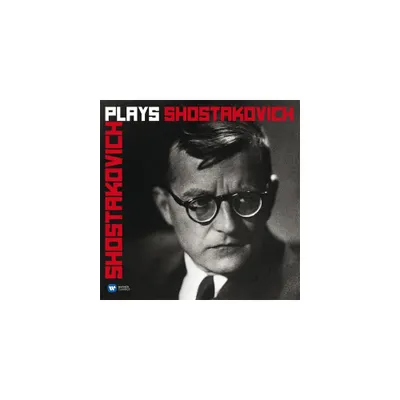Home
Acrobat: Music for, and by, Dmitri Shostakovich
Loading Inventory...
Barnes and Noble
Acrobat: Music for, and by, Dmitri Shostakovich
Current price: $17.99


Barnes and Noble
Acrobat: Music for, and by, Dmitri Shostakovich
Current price: $17.99
Loading Inventory...
Size: OS
*Product Information may vary - to confirm product availability, pricing, and additional information please contact Barnes and Noble
Avant-garde bassist
Michael Bates
identifies the connection between the
Stravinsky
-influenced modern classical music of
Shostakovich
and his own free jazz tendencies on
Acrobat: Music for, and by, Dmitri Shostakovich
. Actually, only one track, the leadoff one, "Dance of Death," is a
composition, and that piece, as played by a group in which
Bates
is joined by
Russ Johnson
(trumpet),
Chris Speed
(clarinet, saxophone),
Russ Lossing
(acoustic and Fender Rhodes electric pianos), and
Tom Rainey
(drums), comes off in the style of
Kurt Weill
's German period, as if it were a bit of incidental music from the score of The Threepenny Opera. On
' compositions written for
, the group can be playful, as is
Speed
's clarinet on "Talking Bird," and it can turn in a straight bebop performance, as it does on "Strong Arm," which pairs
Johnson
's trumpet with
' bass in ascending and descending patterns, then follows with
Lossing
's electric piano against
Rainey
's busy drumming. "Some Wounds" is a slow blues with a mournful saxophone solo, while the equally melancholy "Fugitive Pieces" is more melodic and, as its title implies, more of a suite with sections strung together, including an unaccompanied clarinet solo. Later tracks, starting with "Silent Witness," are more typical free works, with every man for himself, the only apparent agreement about how to play concerning tempo. Yet these are experienced musicians capable of giving such music the risky, exciting feeling of free jazz, in which things always seem about to fall apart entirely, but never do. What it all has to do with
may be more inspirational than literal, but the composer's reputation is only enhanced by an association with such inspired playing. ~ William Ruhlmann
Michael Bates
identifies the connection between the
Stravinsky
-influenced modern classical music of
Shostakovich
and his own free jazz tendencies on
Acrobat: Music for, and by, Dmitri Shostakovich
. Actually, only one track, the leadoff one, "Dance of Death," is a
composition, and that piece, as played by a group in which
Bates
is joined by
Russ Johnson
(trumpet),
Chris Speed
(clarinet, saxophone),
Russ Lossing
(acoustic and Fender Rhodes electric pianos), and
Tom Rainey
(drums), comes off in the style of
Kurt Weill
's German period, as if it were a bit of incidental music from the score of The Threepenny Opera. On
' compositions written for
, the group can be playful, as is
Speed
's clarinet on "Talking Bird," and it can turn in a straight bebop performance, as it does on "Strong Arm," which pairs
Johnson
's trumpet with
' bass in ascending and descending patterns, then follows with
Lossing
's electric piano against
Rainey
's busy drumming. "Some Wounds" is a slow blues with a mournful saxophone solo, while the equally melancholy "Fugitive Pieces" is more melodic and, as its title implies, more of a suite with sections strung together, including an unaccompanied clarinet solo. Later tracks, starting with "Silent Witness," are more typical free works, with every man for himself, the only apparent agreement about how to play concerning tempo. Yet these are experienced musicians capable of giving such music the risky, exciting feeling of free jazz, in which things always seem about to fall apart entirely, but never do. What it all has to do with
may be more inspirational than literal, but the composer's reputation is only enhanced by an association with such inspired playing. ~ William Ruhlmann


















